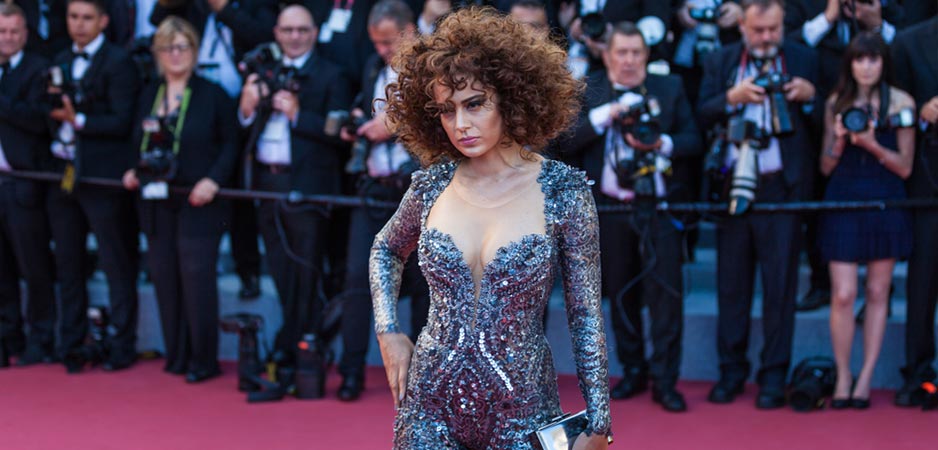Beware of who you follow, my mother always said, because not everyone has your best interests in mind. I must have forgotten this advice those couple of years when I considered Bollywood actress Kangana Ranaut to be a female empowerment idol in India. Anyone who follows Bollywood is aware of the stir that Ranaut caused in the male-dominated film industry. An important one. A long overdue one.
I started following Ranaut after her appearance on the talk show, “Aap Ki Adalat” (Your Court), where she narrated her controversial affair with one of Bollywood’s male superstars, Hrithik Roshan. Like any other woman in the world, I could relate to the sexist and judgmental limelight that Ranaut found herself in. I could relate to a patriarchal culture’s impulse to side with the popular married man (Roshan) who held more power over her, not only in terms of Bollywood lineage, but also gender. I could relate to her discomfort from being in a relationship with an unreliable and controlling heterosexual man.
That was September 2017, and Ranaut’s testimony became the talk of the town. Right around the time of her next film’s release, she decided to clarify some things like the legal notices she and Roshan had filed against each other. Kangana’s revelations were shocking but nonetheless crucial to engage with. She needed to be heard. As a woman, it was essential for me to hear another woman without prejudice.
I was enthralled by Ranaut’s articulate demeanor, her logical and accurate timeline of events. Dressed in a simple saree, she held her calm, was funny, snarky and familiar. There was ample evidence to investigate and hold Roshan accountable for his deeds. The Indian Express called her act “bold,” “daring” and “confident.” The Indian feminist consciousness saw a strong ally in a popular actress like her.
I was ecstatic too. A woman from a small town in Himachal Pradesh, a self-made woman who started building the career of her choice since she was 16 years old, Ranaut was speaking truth to power. She was talking about the glaring discrimination and harassment within the glamorous Indian film industry.
Ranaut was the unabashed voice we were waiting for. She represented change. Given the cultural capital she had as an actor, she kick-started a new wave of feminism. About Roshan, she said: “He didn’t know that the flop actress he was dating would become a star after Queen and a superstar after Tanu-Manu. He didn’t realize that she would have a long journey, and nobody would listen to him.” Ranaut’s reclaiming of power in a hyper-masculine Bollywood industry with no star lineage was a breath of fresh air.
But public consciousness was divided. People called her a crazy control freak. They called her a maniac. Her ex-boyfriend, Adhyayan Suman, chimed into this “mad woman” rhetoric too. In an interview with the Indian newspaper DNA, he alleged that Ranaut had abused and performed “black magic” on him during their year-long courtship. This was nothing new. Women have been called crazy every time they have garnered the courage to speak out against sexism or harassment or simply the right to be treated as humans. Ranaut was no exception, and she took all the criticism with ease.
And then things began to change. In less than two years, Ranaut started misusing all the cultural capital she had earned. Amongst her important criticism of Bollywood culture, one could detect traces of Hindu nationalist jargon. She became self-righteous. She propped herself up by putting others down without evidence. Ironically, within a year, she began to resemble her oppressor: patriarchy.
From Truth to Power Abuse
Now, almost two years after Ranaut’s spill-it-all interview, I do not recognize her at all. The Ranaut of today is a patriarchal ally who has bargained her emboldened voice for Hindutva favors. This ideology seeks to establish the hegemony of Hindus in India, and Ranaut has become the darling of the Hindutva radical right-wing movement.
She recently lashed out against journalist Justin Rao at a promotional event, accusing him of a negative film review. She has criticized Bollywood veterans like Shabana Azmi, calling them “anti-nationals.” She has shamed a young actress, Alia Bhatt, for her relationship with an older actor, Ranbir Kapoor, proudly saying that at Bhatt’s age (27), she was busy writing dialogs for her movie, “Queen.” She further said that her mother had three children at Bhatt’s age. Ranaut has called for the destruction of Pakistan after cross-border terror attacks by Pakistani militants. She has threatened Bollywood openly, saying: “Now, I will teach them a lesson. They have ganged up on me.”
Her sister, Rangoli Chandel, has jumped on board. As has the nearly forgotten Bollywood beauty, Payal Rohatgi. If taken in isolation, Ranaut’s reaction on the cross-border terrorism is understandable, as Indians get emotionally charged over their country’s security. However, armed with their new-found nationalism, Ranaut, Chandel and Rohatgi are amplifying a very sensitive national issue to strengthen partisan attitudes nationwide. With the cultural power they possess, one must be wary of what they say and how they say it. Sadly, their social media tone is further widening the religious, caste-based chasm that common Indians have grappled with for years.
Cross-border terrorism is a complicated matter. Cries for the destruction of a neighboring country is calling for genocide. Anti-Pakistan sentiment coupled with attacks on Islam leads these women to even exoticize an inhuman, regressive practice of Sati, the burning of the widow on the funeral pyre of her late husband. Historical heroes like Raja Ram Mohan Roy — regarded as the father of the Indian renaissance — are not spared either, and neither are fellow Indian women. Everything goes hand in hand. If that isn’t the case, then we haven’t been lucky enough to hear Ranaut and the others clarify their stance.
As a woman, I struggle to make sense of the mockery these women make of female empowerment. And then, a bigger question arises: Is the realignment of their beliefs with radical right-wing sentiment an attempt to re-brand themselves as “sane” and capture a nationalist-masculine consciousness?
Interestingly, a right-wing repackaging has helped them gain mass support from right-wing men. There was a time when scrolling through Facebook, one could see men calling out Ranaut as “psychotic” among several other terms that I choose not to mention for my own mental sanity. Today, such men are calling her heroic. Famous nationalists like actor Anupam Kher call her a “real example of women empowerment.”
But is real women empowerment only possible through advertising partisan politics and masculine nationalism? Can there be a way for women to be accepted regardless of a nationalist, minority-hating fervor? Can women be feminist without practicing divisive nationalism? Is our rage, anger and frustration as victimized women only sanctioned if we repackage ourselves as aggressive right-wing women?
The Masculine Rage
In her book, “Good and Mad: The Revolutionary Power of Women’s Anger,” Rebecca Traister chronicles how rage doesn’t work the same way for women as men. While talking to journalist Ezra Klein on his podcast, “The Ezra Klein Show,” she investigates the unifying effect of women’s rage for dismantling patriarchal practices. She rightly says that “women’s anger invalidates their experience.” Women are not encouraged to be angry. “Their anger undermines the credibility of their stories.”
Anger in men is sexy, erotic. With women, anger should not be openly demonstrated and certainly not while calling out male harassers. It is not pretty. Christine Blasey Ford and Anita Hill must remain calm while narrating their harassment in courtrooms. However, Brett Kavanaugh can scream, cry, whine and still make his way to the US Supreme Court.
Similarly, Indian women’s anger has not been promoted and glorified except in images of Hindu goddesses. Kali and Durga are the females exoticized and celebrated for their anger. The sad case of Kangana Ranaut and those like her is similar. These women have realized the cruel reality of the weakness of their feminist anger in a patriarchal culture and may have tactfully partnered with the current, pervasive Hindutva masculine rage.
Rohatgi says Sati was a woman’s choice. Defaming social reformer Roy, she tweets: “No he was a chamcha [sycophant] to Britishers who used him to defame the Sati tradition. Sati tradition was not compulsory but was introduced to prevent the prostitution of Hindu wives by the hands of Mughal invaders. It was the woman’s choice. #FeministsofIndia Sati was not regressive.”
These women are effectively abusing vulnerable Indian emotion. It saddens me. I should be able to trust women like Ranaut and Rohatgi who were among the very first voices of dissent against sexual harassment in Bollywood. Today, not only do I fear these women who glorify hyper-nationalism and practice selective feminism, but I also fear that this would potentially crush our vision of a national sisterhood. Their vehement right-wing political identity divides the common Indian sensibility further.
Time to Pay Heed
Before I finish, let me clarify. Just because I am critiquing another woman, it is not for men to celebrate and say: See, feminism is a cancer. No matter what, Kangana Ranaut, Rangoli Chandel and Payal Rohatgi’s transformation into powerful religious bigots does not mean that all women are like them. It is not similar to the power that men have been bestowed upon historically, merely on the basis of their sex. These women’s right-wing patriarchal alliance is a symptom of a bigger problem.
Even after 72 years of independence, we as an Indian society have not provided our women with effective options for self-actualization and empowerment. Hence, their survival still lies in mirroring the regressive patriarchy in identity.
This article is not meant for readers to conclude that criticizing women means one is not a feminist. This is a much-needed intervention in India’s growing feminist culture. Rather, this is a call to stop and reflect on what could possibly go wrong when we are fighting for a fairer society. This is a request to be ready to critique one of our own: patriarchal women.
The views expressed in this article are the author’s own and do not necessarily reflect Fair Observer’s editorial policy.
Support Fair Observer
We rely on your support for our independence, diversity and quality.
For more than 10 years, Fair Observer has been free, fair and independent. No billionaire owns us, no advertisers control us. We are a reader-supported nonprofit. Unlike many other publications, we keep our content free for readers regardless of where they live or whether they can afford to pay. We have no paywalls and no ads.
In the post-truth era of fake news, echo chambers and filter bubbles, we publish a plurality of perspectives from around the world. Anyone can publish with us, but everyone goes through a rigorous editorial process. So, you get fact-checked, well-reasoned content instead of noise.
We publish 2,500+ voices from 90+ countries. We also conduct education and training programs
on subjects ranging from digital media and journalism to writing and critical thinking. This
doesn’t come cheap. Servers, editors, trainers and web developers cost
money.
Please consider supporting us on a regular basis as a recurring donor or a
sustaining member.
Will you support FO’s journalism?
We rely on your support for our independence, diversity and quality.






